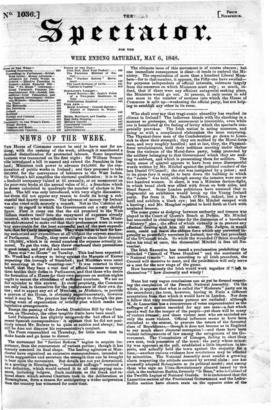NEWS OF THE WEEK.
THE House of Commons cannot be said to have met for no- thing, with the opening of the week, although it manifested a decided disinclination for protracted labours. Some important business was transacted on the first night: Sir William Somer- ville introduced a bill to amend and extend the franchise in Ire- land; Ministers took power to advance 945,0001. for the con- tinuation of public works in Ireland ; and they proposed to take 200,000/. for the conveyance of labourers to the West Indies. Sir William's bill simplifies the electoral qualification : it is to be a freehold occupancy valued at 5/. annually, or an assessment on the poor-rate books at the annual value of 8/. ; a franchise which he deems calculated to quadruple the number of electors in Ire- land. The bill was only introduced, with very slight discussion ; but there did not appear any reason to doubt its being a sub- stantial and hearty measure. The advance of money for Ireland was also voted with scarcely a remark. Not so the Colonial ad- vance; in regard to which the Government cut a very shabby figure. First it came out that the aid promised to the West Indians resolves itself into the repayment of expenses already incurred, with what insignificant results we know. Then Minis- ters endeavoured to make out that their predecessors were in some way answerable for the least successful part of the past expendi- ture, that for Cooly immigration. They were taken to task for hav- ing authorized any expenditure at all without the express sanction of Parliament. Finally, they were obliged to abate their demand to 170,000/., which is in round numbers the expense actually in- curred. To get the vote, they threw overboard their pretensions to good intent, and yet did not succeed! There was "no House" on Tuesday. This had been expected : Mr. Wood had a charge to bring against the Marquis of Exeter respecting the borough of Stamford ; and Ministers were rated for conniving at the " counting-out." It was retorted in their behalf, that they have a vast deal of official business to occupy them besides their duties in Parliament, and that those who desire the formation of a House for their own purposes on motion-nights ought to secure the attendance of sufficient numbers. We see no fair rejoinder to this answer. In strict propriety, the Commons can only look to themselves for the performance of their own du- ties ; and to expect any set of Members, as Ministers, to provide a quorum of the House, is obviously unparliamentary, however usual it may be. The practice has only crept in through the per- vading want of organization or orderly plan which marks our legislative arrangements.
Except the passing of the Jewish Disabilities Bill by the Com- mons, on Thursday, the other tangible fruits have been small.
Lord Palmerston has slightly mitigated, the bad effect of his recent Spanish correspondence : it appears that he did not posi- tively intend Mr. Bulwer to be quite so sudden and abrupt; but still he does not disavow his representative's conduct.
The Peers reassembled on Thursday, for little more than to shake hands and go home to dinner.


























